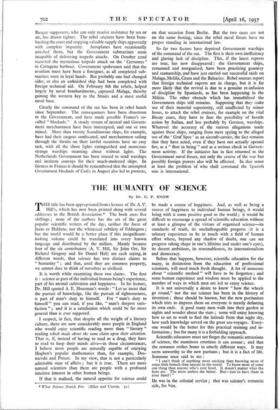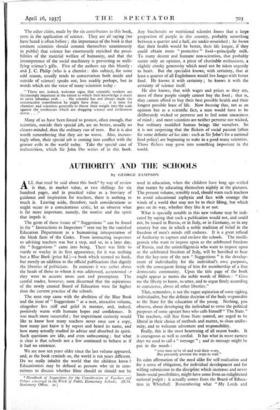THE HUMANITY OF SCIENCE
By Dr. C. P. SNOW
It is worth while examining these two claims. The first is : science as part of the individual human being's experience, part of his mental cultivation and happiness. In his lecture, Dr. Hill quoted A. E. Housman's words : " Let us insist that the pursuit of knowledge, like the pursuit of righteousness, is part of man's duty to himself. For " man's duty to himself " you can read, if you like, " man's deepest satis- faction " ; and it is a satisfaction which could be far more general than is ever supposed.
I suspect, in fact, that despite all the weight of a literary culture, there are now considerably more people in England who would enjoy scientific reading more than " literary " reading which made about the same claim upon their attention. That is, if instead of having to read as a drug, they have to read to keep their minds alive—in those circumstances, I believe more people are naturally capable of enjoying Hogben's popular mathematics than, for example, Dos- toevski and Proust. In my view, that is not a particularly admirable state of affairs ; but it is true. There are more natural scientists than there are people with a profound intuitive interest in other human beings.
If that is realised, the natural appetite for science could a What Science Stands For. (Allen and Unwin. 5s.) be made a source of happiness. And, as well as being a source of happiness to individual human beings, it would bring with it some positive good to the world ; it would be difficult to encourage a spread of scientific education without at least a glimpse of the virtues of organised science—its standards of truth, its unchallengeable progress (it is a salutary experience to be in touch with a field of human effort where, beyond any shadow of doubt, one can see progress taking shape in one's lifetime and under one's eyes), its decent ambitions, its reasonableness, its internationalism and democracy.
Before that happens, however, scientific education for the many, in distinction from the education of professional scientists, will need much fresh thought. A lot of nonsense about " scientific method " will have to be forgotten ; and some human experience and wisdom must be applied to the number of ways in which men are led to enjoy science.
It is not universally a desire to know " how the wheels go round," nor the use science has been in the history of invention ; those should be known, but the new puritanism which ties to impress them on everyone is merely defeating its own ends. A good many men walk into their garden at nights and wonder about the stars ; some will enjoy knowing how to set to work to find the latitude from that night sky, how such knowledge served on the great sea-voyages. Every- one would be the better for this practical training and in- formation ; but for many it is a forbidding approach.
Scientific educators must not forget the romantic attractions of science, the numinous emotions it can arouse ; and that the romance strikes home in utterly different ways. It may seem unworthy to the new puritans ; but it is a fact of life.
Someone once said to me : " I can't think of anything more exciting than knowing more of some little branch than anyone in the world. To know more of some one thing than anyone who's ever lived. It doesn't matter what the facts are. The more useless the better. But—just to have them in your hand ! "
He was in the colonial service ; that was science's romantic side, for him. The other claim, made by the six contributors to this book, rests in the application of science. They are all saying (we have heard it often before ; the importance of the book is that eminent scientists should commit themselves unanimously in public) that science has enormously enriched the possi- bilities of the material welfare of humanity, and that the incompetence of the social machinery is perverting or nulli- fying science's gifts. Five of the authors say this bluntly : and J. C. Philip (who is a chemist : this subject, for some pdd reason, usually tends to conservatism both inside and outside of science) speaks out, less readily perhaps, but in words which are the voice of many scientists today :
"There are, indeed, welcome signs that scientific workers are increasingly impatient at the extent to which their knowledge is made to serve inhuman ends . . . the scientist has not always made the constructive contribution he might have done . . . it is time for chemists and scientists generally to throw their weight into the scale against the tendencies which are dragging science and civilisation down . . ."
Many of us have been forced to protest, often enough, that scientists, outside their special job, are no better, usually no clearer-minded, than the ordinary run of men. But it is also worth remembering that they are no worse. Also, increas- ingly often, their special job is coming into conflict with the grosser evils in the world today. Take the special case of malnutrition, which Sir John Orr writes of in this book. Any biochemist or nutritional scientist knows that a large proportion of people in this country, probably something between a quarter and a half, are under-nourished ; he knows that their health would be better, their life longer, if they could obtain more " protective " food—principally milk. To many decent and humane non-scientists, that probably seems only an opinion, a piece of charitable enthusiasm, a slightly cranky generosity which need not be taken urgently to heart. But the specialist knows, with certainty, that at least a quarter of all Englishmen would live longer with better food. He knows it with certainty ; he knows it with the certainty of science itself.
He also knows, that with wages and prices as they are, most of these people simply cannot buy the food ; that is, they cannot afford to buy their best possible health and their longest possible lease of life. Now knowing that, not as an opinion but as a scientific fact, a man would have to be deliberately wicked or perverse not to fed some uneasiness of mind ; and most scientists are neither perverse nor wicked, but ordinary muddled human beings like ourselves. So it is not surprising that the flickers of social passion (often for some definite ad hoc aim: such as Sir John's for a national food policy) are beginning to wake in a good many scientists. Those flickers may grow into something important in the world.























































 Previous page
Previous page